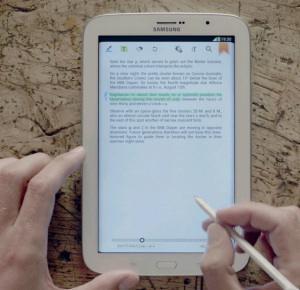 We think many users do not care about Office functionality; their needs are for content consumption and ability to access the internet and note-taking. Where there is a need for greater functionality in content creation, Office should be an important lever to anchor productivity users to the Windows platform. The desire to have one device instead of carrying both a tablet and a notebook (also a smartphone of course) would work to Microsoft’s advantage, particularly if Apple is predominately selling the 8 inch iPad mini, where the screen is more limiting as a productivity device.
We think many users do not care about Office functionality; their needs are for content consumption and ability to access the internet and note-taking. Where there is a need for greater functionality in content creation, Office should be an important lever to anchor productivity users to the Windows platform. The desire to have one device instead of carrying both a tablet and a notebook (also a smartphone of course) would work to Microsoft’s advantage, particularly if Apple is predominately selling the 8 inch iPad mini, where the screen is more limiting as a productivity device.
We expect Microsoft to leverage the collaboration capabilities of Office 2013 by putting the ability to read and edit an Office document on the iPad in 2013 and maybe on Android as well, but not the full functionality of Office that would have greater cannibalization potential to Windows. To increase the ability to share documents, this is important to be cross-platform, particularly if the other platforms are measured in hundreds of millions of users.
Microsoft has already made available a limited version of OneNote for note taking and the ability to access SkyDrive for file sharing on iOS and Android. It is not clear at what price further releases of Office apps may be offered, but clearly not at the full price and full functionality of Office. This would be more about enhancing collaboration and therefore the value of Office to the productivity user.
We think 2013 will be about upgrading to new form factors, with some of the market defecting in a more complete way to the Apple ecosystem and some upgrading to next generation devices that have more Office compatibility on Windows 8. The dynamics of how this plays out depends importantly on whether a user might be influenced by the need to have Office compatibility and how much share Apple and Google can capture as users express a desire to change their computing experience to a new generation of mobile and always connected devices with instant-on, longer battery life and lighter weight.
Many users have already purchased an iPad and iPhone and may currently straddle both the Apple and Microsoft platforms and may be influenced to carry a single device that has greater functionality than the iPad. Some have no real need for Office and have no need for Windows; they only purchased a notebook to access the internet and are more into communications and content consumption. A sizable chunk of the market that is already likely in the Apple camp to a significant enough degree that they may be lost to the Windows franchise and maybe the Office franchise as well. It is likely that Microsoft will try to retain a link to these users with some Office functionality as noted earlier, but for growth, Microsoft is likely better off focusing on the users that value Office.